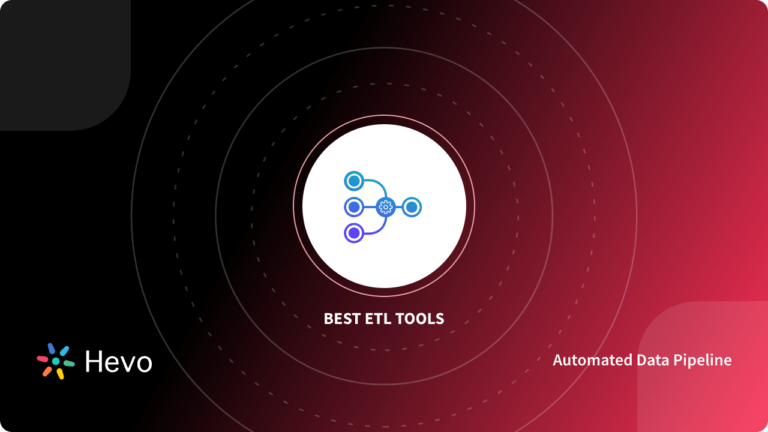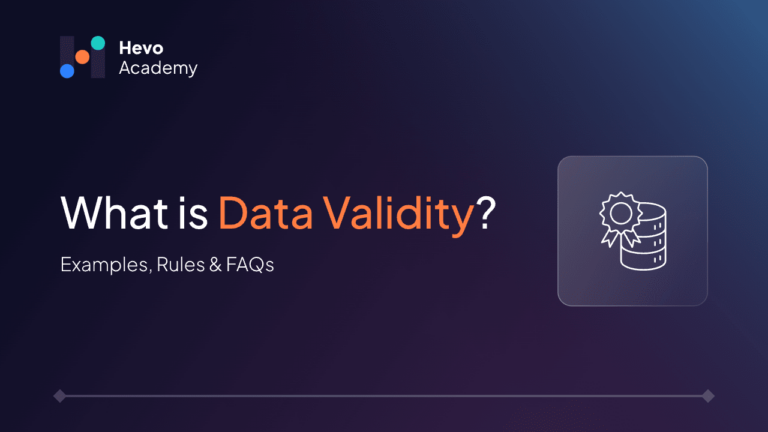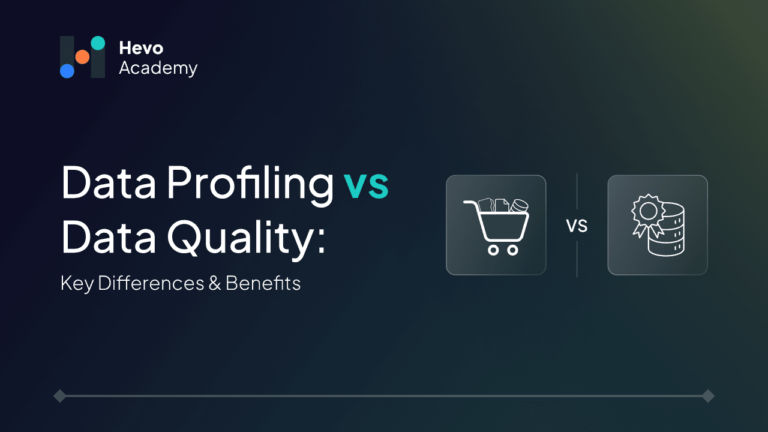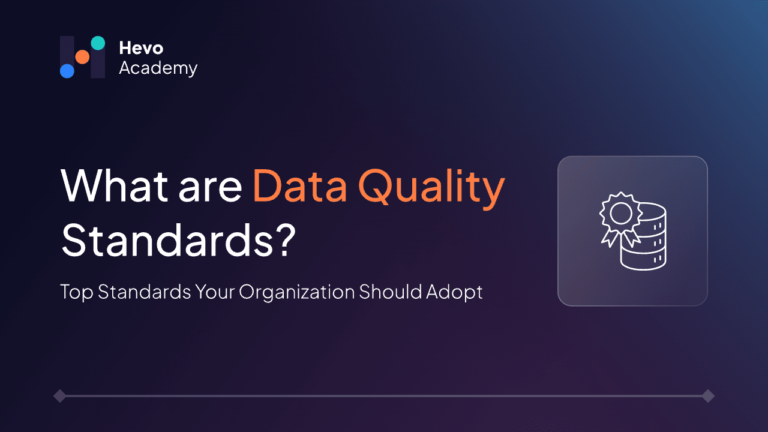The management and movement of data are critical business functions in the big data and analytics era. The need for strong ETL (Extract, Transform, Load) solutions has grown very rapidly. Among the important markers of development, the Data Integration Market is one that is said to be around USD 12.05 billion in 2024 and estimated to reach up to USD 18.71 billion by the end of 2029 with a CAGR of 9.20% during the forecast period 2024-2029 as per Mordor Intelligence report.
Table of Contents
With the advent of cloud computing, along with real-time data integration, organizations are becoming increasingly dependent on the best ETL tool available to make their data pipelines as efficient as possible. The bottom line is that whether for structured or unstructured data, a suitable ETL tool will do much to reduce costs, enhance efficiency, and discover business-critical insights sooner. Here, we talk about the best ETL tools in 2024 and group them for you by type so that you can decide which one is most likely to work for your organization.
What is ETL and Why is ETL Becoming Necessary?
- ETL means that extract data from various sources, transform it to fit operational needs, and load it on a destination destination-l similar to a data warehouse. It is, therefore, the process that assures data organization and cleaning and optimizes it for decision-making. All that is increasingly handled by business in managing volumes of data calls for ETL.
- According to a report by IDC, the global datasphere will be at 175 ZB by 2025. This is higher than what it was at the start of 2018, which was at 33 ZB. Such an increase in data volume calls for efficient data integration methods such as ETL.
What is ETL Tool?
- ETL tools help companies automate the entire process of ETL, thus eliminating manual efforts and ensuring that the data provided on every platform is the same.
- Companies can thus be extremely confident about the preparedness of their data in reporting and analysis at all times, making it quicker and quicker through better data-driven decision-making.
- To learn more about ETL tools you can check Hevo’s blog on ETL tools.
Looking for the best ETL tools to connect your data sources? Rest assured, Hevo’s no-code platform helps streamline your ETL process. Try Hevo and equip your team to:
- Integrate data from 150+ sources(60+ free sources).
- Utilize drag-and-drop and custom Python script features to transform your data.
Try Hevo and discover why 2000+ customers have chosen Hevo over tools like AWS DMS to upgrade to a modern data stack.
Get Started with Hevo for FreeTypes of ETL Tools
Here are four major types of ETL tools, along with their key features:
- Cloud-Based ETL Tools
- These tools are hosted on cloud platforms.
- They are scalable in use.
- Usually involve built-in connectors with cloud data sources and destinations.
- Open Source ETL Tools
- The open-source tools are available free and are mostly extensible.
- They are usually technical, but that also means a lot of latitude for unique use cases.
- Enterprise ETL Tools
- These tools are for large organizations that need higher performance and intense levels of support for compliance, security, and governance.
- Sometimes it has real-time processing, automation, and error-handling capabilities.
- Custom ETL Tools
- These are in-house, with requirements that are beyond what off-the-shelf ETL tools are able to handle.
- Best suited for highly specialized companies with the resources to build in-house solutions.
Why is choosing the right ETL tool becoming crucial?
The right ETL tool can make a big difference to your data strategy for the following reasons:
- Data Complexity: Where businesses collect data from various sources, there comes a point where a suitable tool for the complex transformations is required, ETL tool must be capable of handling such transformations.
- Scalability: ETL tools that scale with the volume of data, avoid performance problems caused by the demand created by data.
- Ease of use: Ease in use of ETL tools interface will reduce the need to require special coding, thus saving time and costs.
20 Best ETL Tools Bases on their Types
Cloud-Based ETL Tools
1. Hevo Data
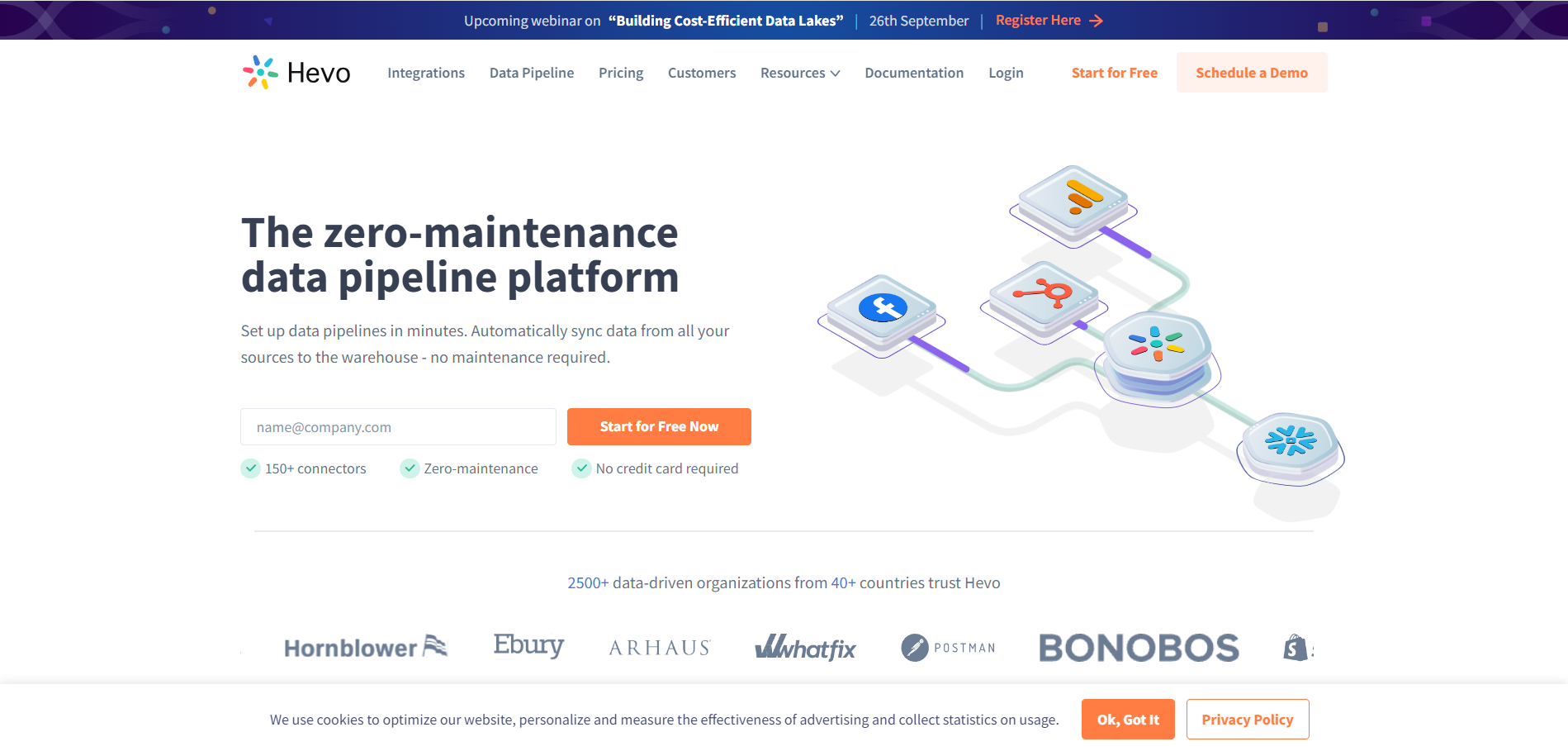
Rating: 4.3(G2)
Hevo Data is a no-code, cloud-based ETL platform designed for real-time data processing. It simplifies data integration with over 150+ connectors and automated schema detection. Ideal for businesses looking for rapid, code-free deployment of data pipelines.
Pricing:
- Free tier available for up to 1 million events.
- Paid plans start at $239/month.
- Pricing is based on events processed per month.
- For details you can check out Hevo’s pricing plan.
Pros and Cons:
| Pros | Cons |
| Real-time data handling. | Difficulty in choosing among a vast number of connectors offered. |
| Easy-to-use, no-code platform. | You can become dependent due to the 24/7 support. There is always someone to answer your queries. |
2. AWS Glue
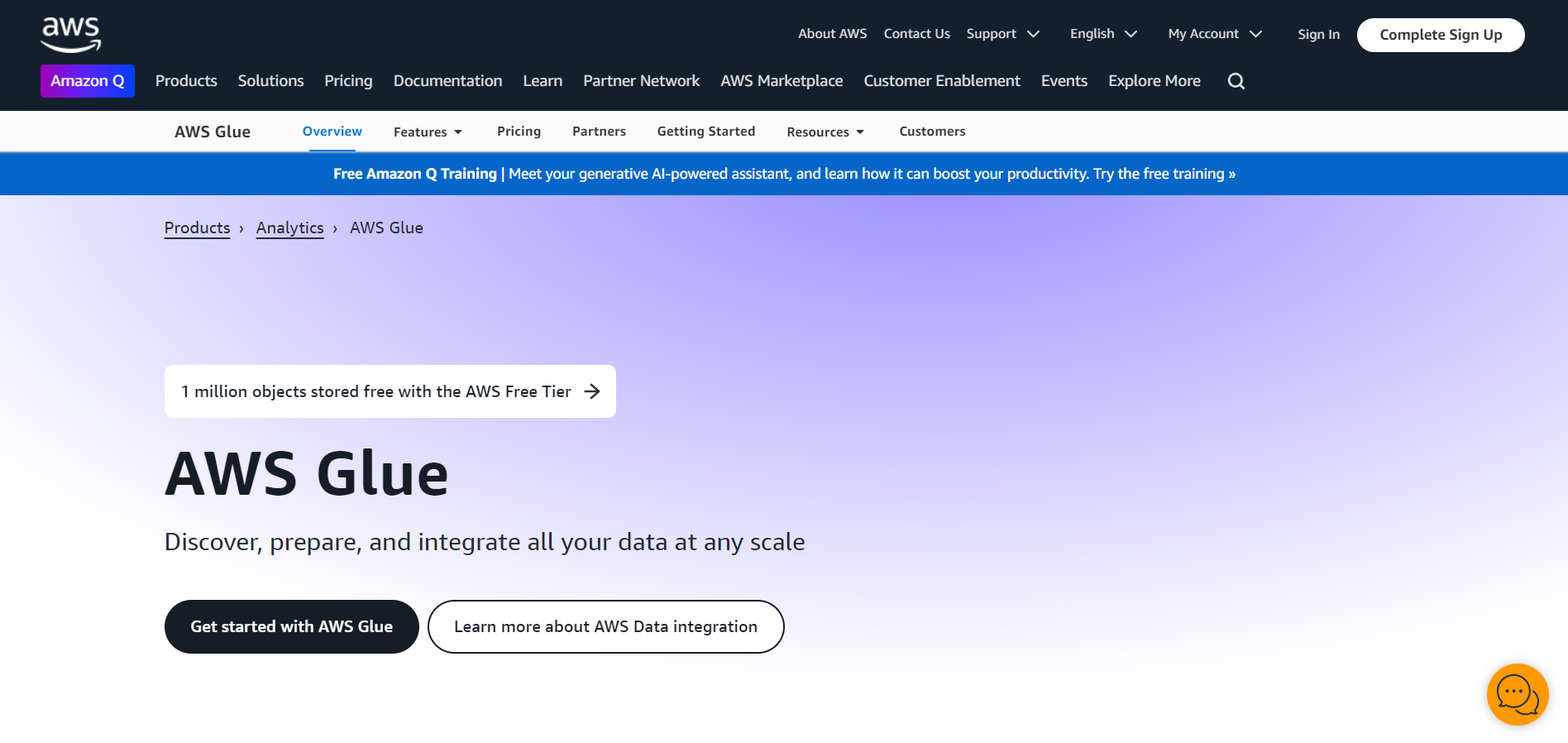
Rating: 4.2(G2)
AWS Glue is a fully managed ETL service provided by Amazon that integrates seamlessly with other AWS services. It allows for easy data cataloging, cleaning, and transforming data for analytics and machine learning applications.
Pricing:
- No upfront costs; pay for resources consumed.
- Charged based on data processing units (DPU) used per hour.
- Costs $0.44 per DPU-hour.
- For details you can check out AWS Glue pricing plan.
Pros and Cons:
| Pros | Cons |
| Seamless integration with AWS services | AWS ecosystem lock-in |
| Serverless architecture | High cost for large-scale operations |
3. Fivetran
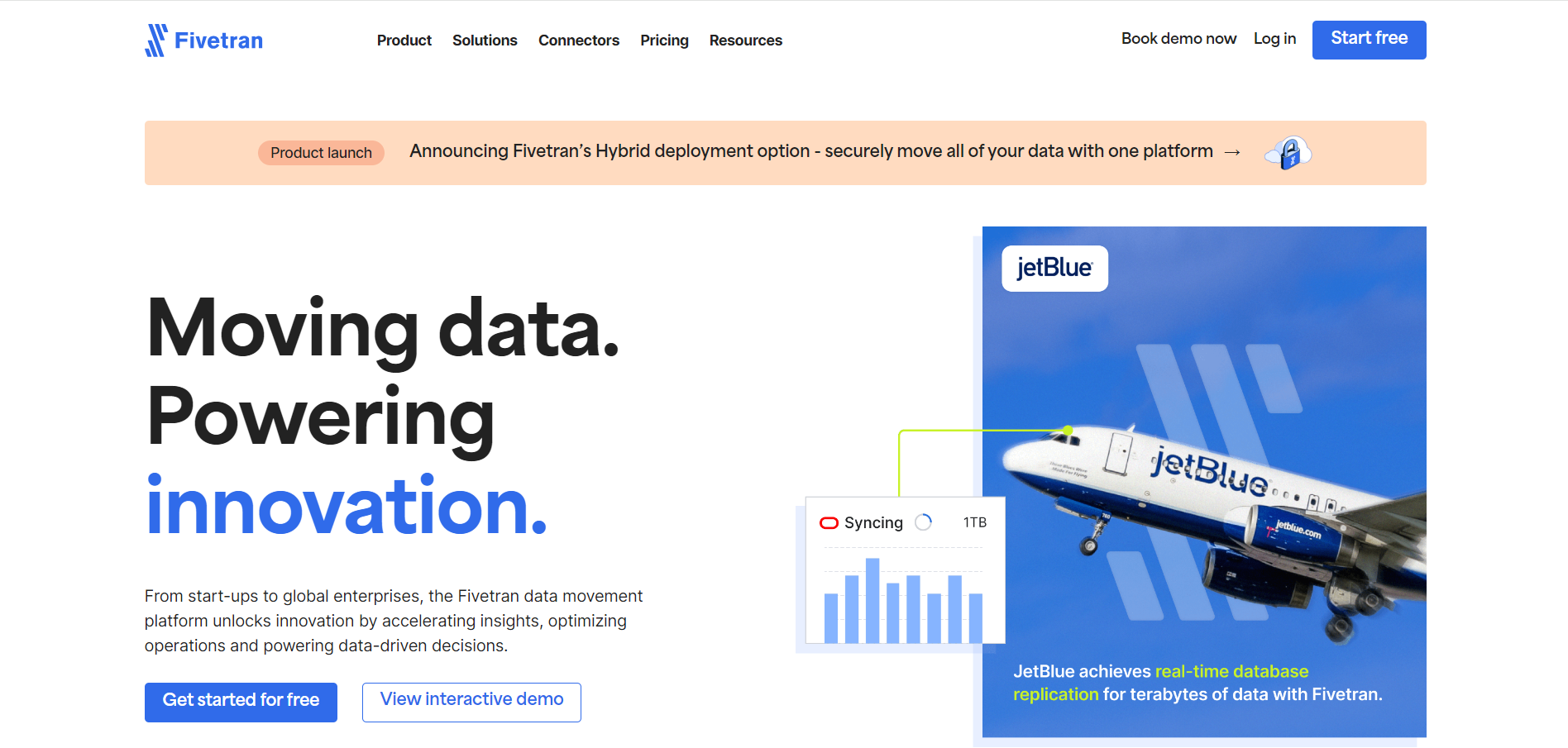
Rating: 4.2(G2)
Fivetran is an automated, cloud-native ETL tool designed to extract data from diverse sources and load it into warehouses. It offers pre-built connectors and a fully automated data pipeline process with automatic schema migrations.
Pricing:
- Free trial available for new users.
- Starts at $120/month for up to 0.5M monthly active rows (MAR).
- Higher tiers scale based on MAR usage.
- For details you can check out Fivetran’s pricing plan.
Pros and Cons:
| Pros | Cons |
| Real-time data sync. | It can become expensive as data volume increases. |
| Wide range of pre-built connectors. | They provide support only in the premium tiers. |
4. Google DataFlow
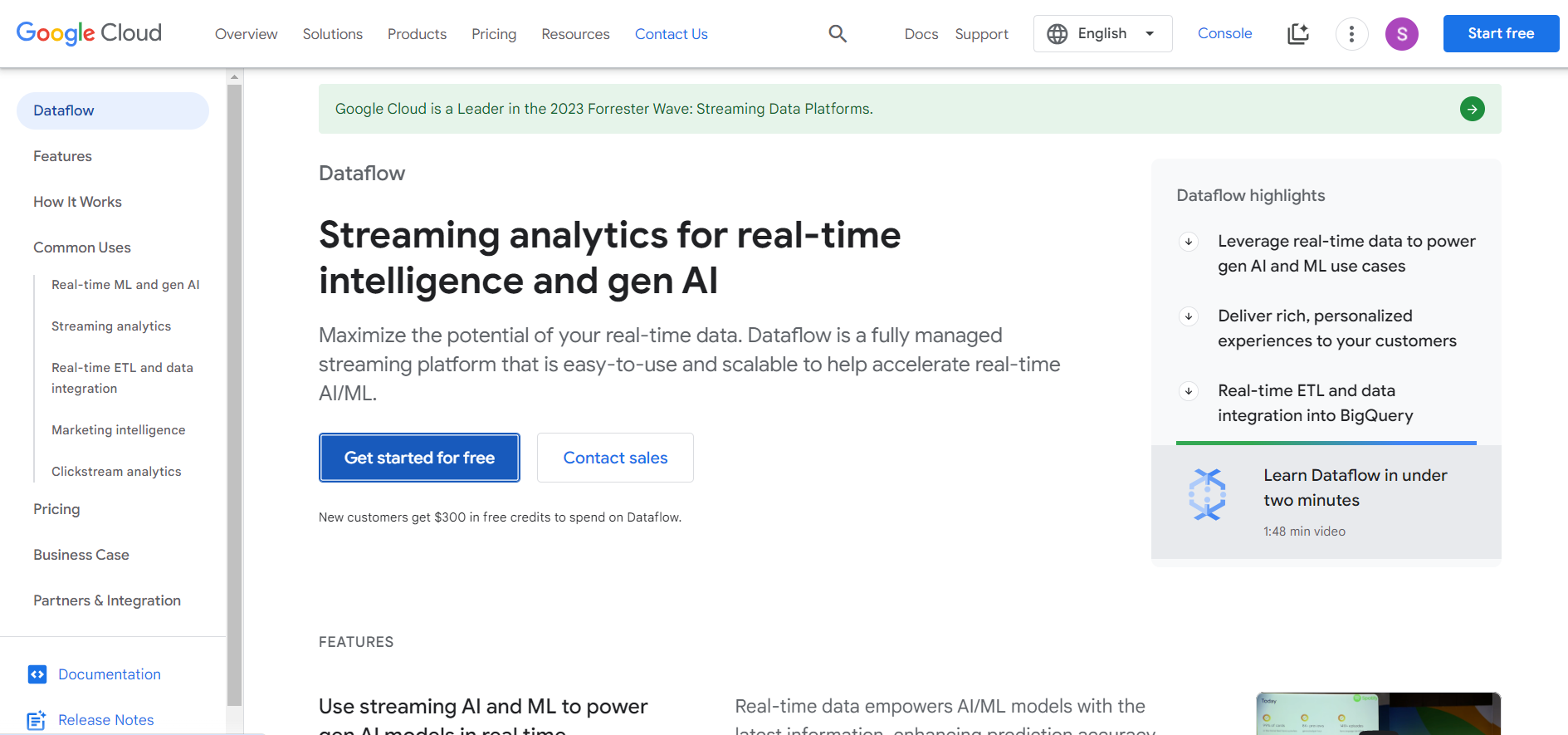
Rating: 4.2(G2)
Google Cloud Dataflow is a serverless ETL solution that provides real-time stream and batch data processing. It is fully managed and integrates well with the Google Cloud ecosystem for scalable data pipelines.
Pricing:
- No upfront costs.
- Pay-as-you-go model, starting at $0.01 per GB processed for streaming data.
- Batch processing costs are determined based on the volume and compute power used.
- For details you can check out Google Cloud Dataflow pricing.
Pros and Cons:
| Pros | Cons |
| Serverless and highly scalable. | Requires knowledge of Beam programming model. |
| Handles both streaming and batch data. | It can be complex for users unfamiliar with GCP. |
5. Stitch
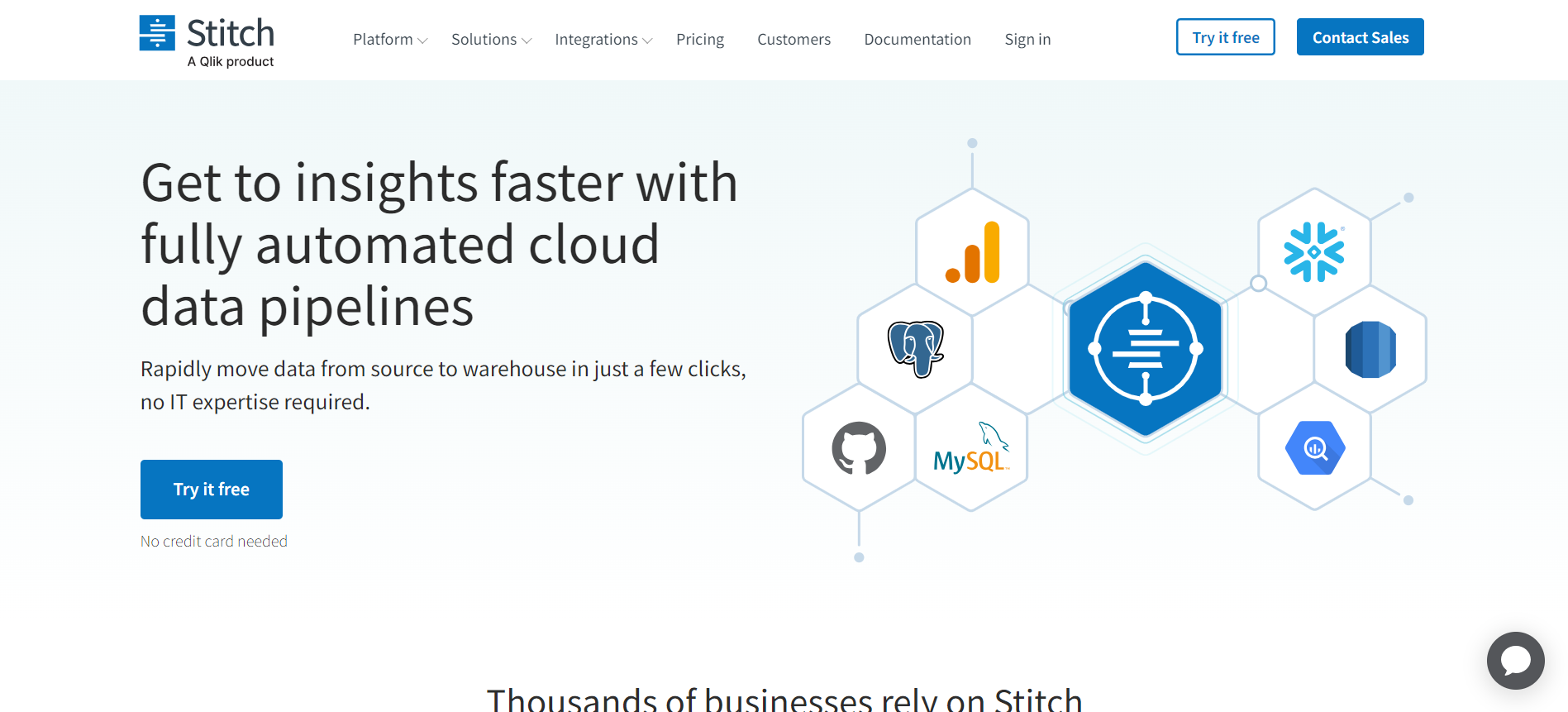
Rating: 4.4(G2)
Stitch is an ETL tool that focuses on simplicity and automation, offering an easy-to-setup process for syncing data from various sources to a destination. It is ideal for businesses with small to mid-size data integration needs.
Pricing:
- Free tier available with limited features.
- Paid plans start at $100/month.
- Pricing is based on monthly active rows (MAR).
- For details you can check out Stitch Data’s pricing plan.
Pros and Cons:
| Pros | Cons |
| Flexible pricing model | Limited transformation capabilities |
| Simple setup | It may require additional tools for data transformation |
Open-Source ETL Tools
1. Apache Nifi
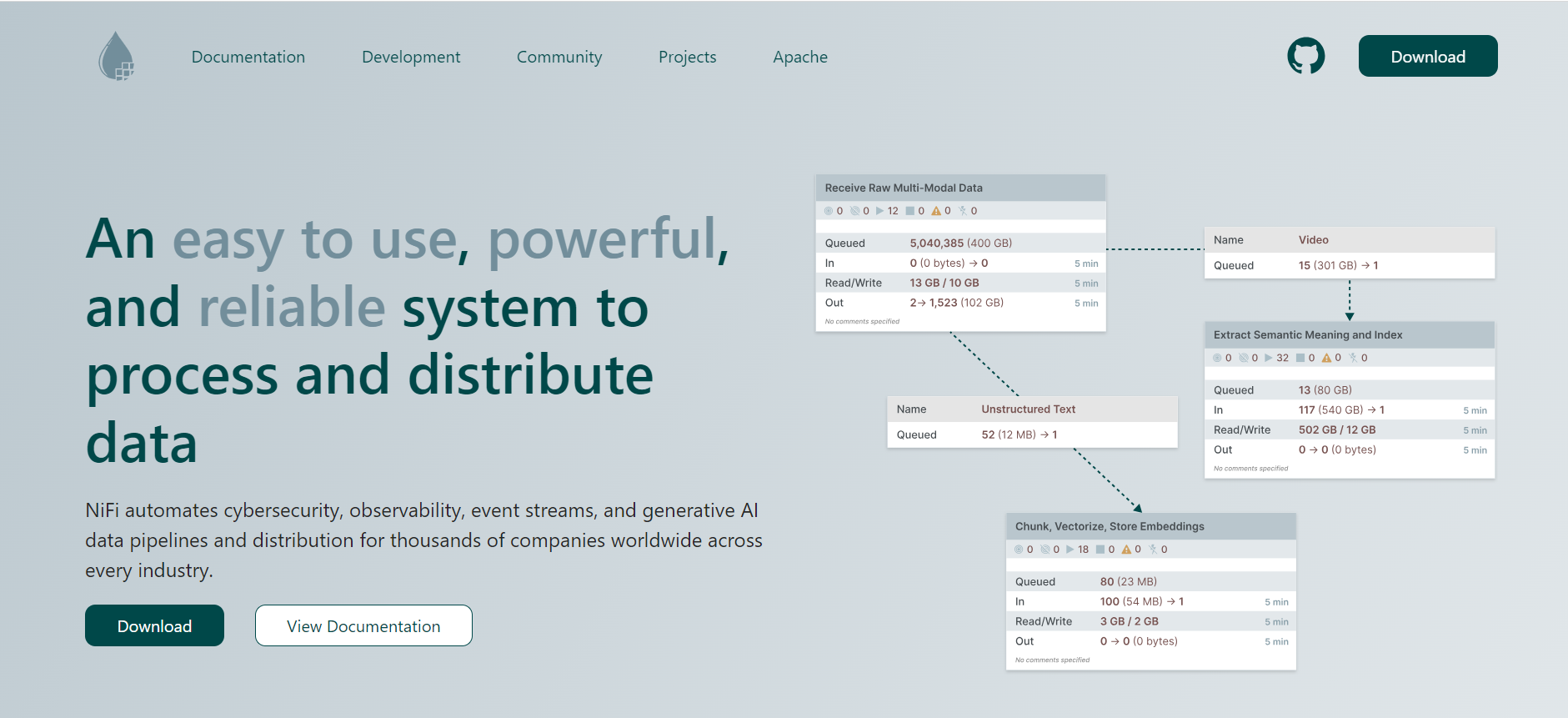
Rating: 4.2(G2)
Apache Nifi is an open-source ETL tool with a visual interface for automating data flows. It is ideal for users who need a highly customizable and extensible platform.
Pricing:
- Free, Open-source.
Pros and Cons:
| Pros | Cons |
| Open-source and free | Resource-intensive |
| Highly customizable | Steeper learning curve |
2. Airflow
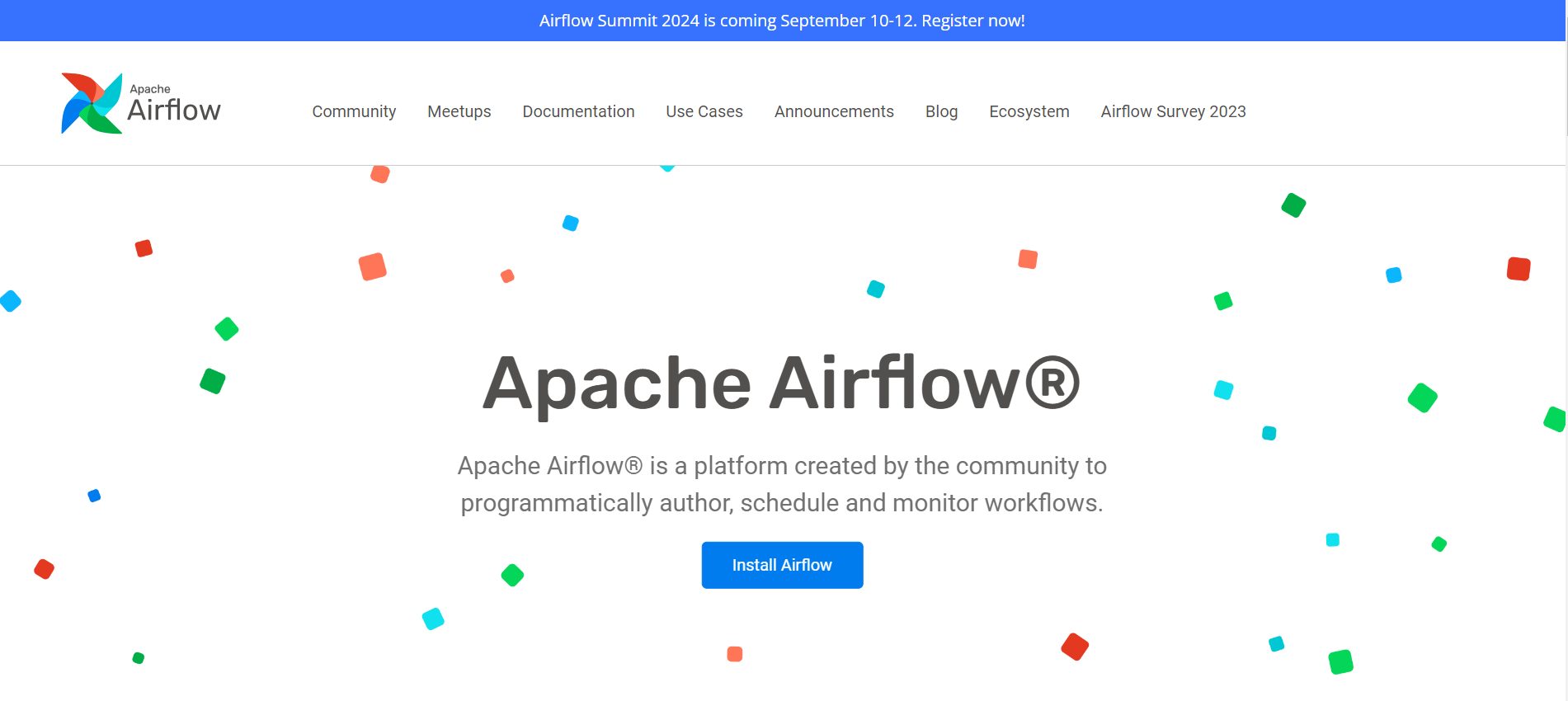
Rating: 4.3(G2)
Apache Airflow is a powerful, open-source workflow orchestration tool that enables the scheduling and monitoring of complex data pipelines. It is highly extensible and widely used for managing ETL processes at scale.
Pricing:
- Free, Open-Source
Pros and Cons:
| Pros | Cons |
| Extensive integration with different services | Complex setup and management |
| Highly customizable and scalable | Requires knowledge of Python and system administration |
3. Pentaho Data Integration
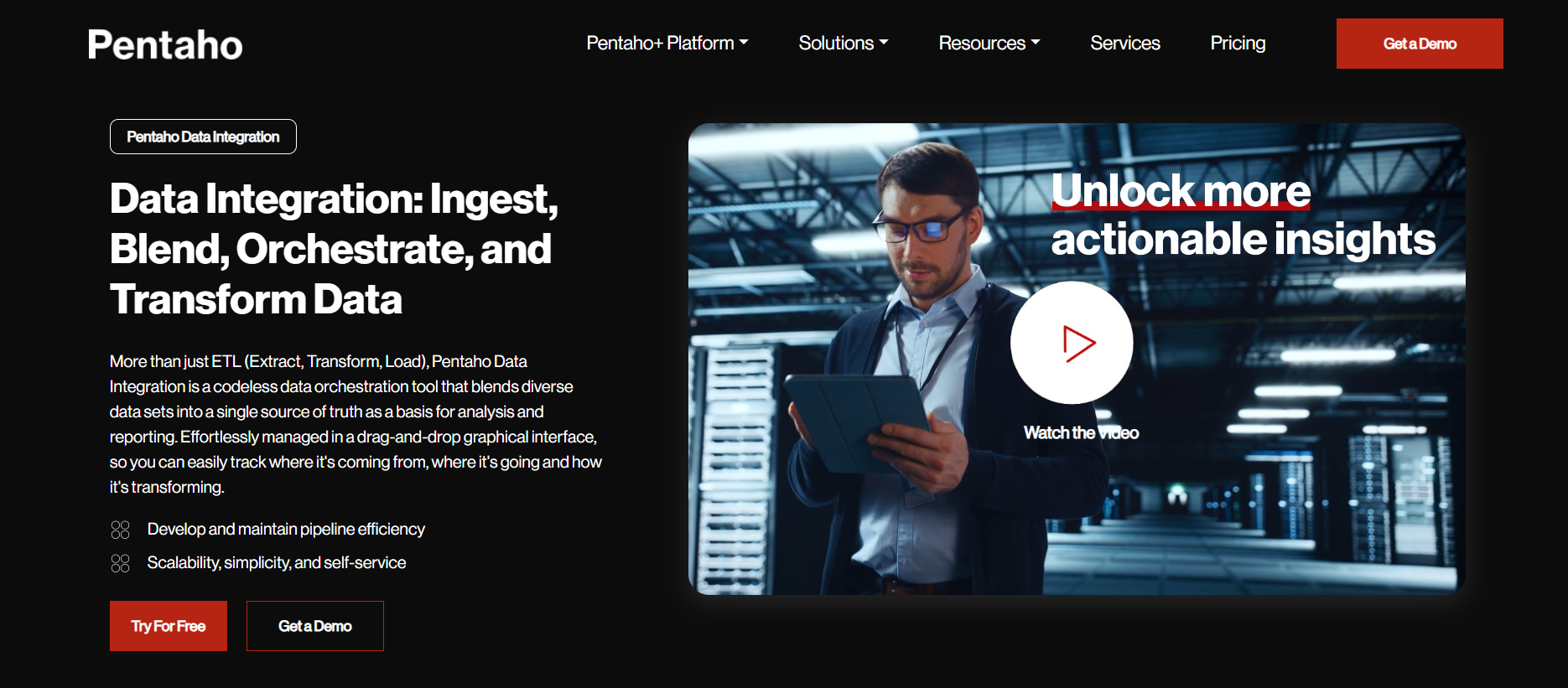
Rating: 4.3(G2)
Pentaho Data Integration is an open-source ETL tool featuring a drag-and-drop interface for building workflows.
Pricing:
- Free, Open-Source
Pros and Cons:
| Pros | Cons |
| Intuitive interface | Limited enterprise support |
| Strong transformation support | Requires plugins for advanced functionalities |
4. Airbyte
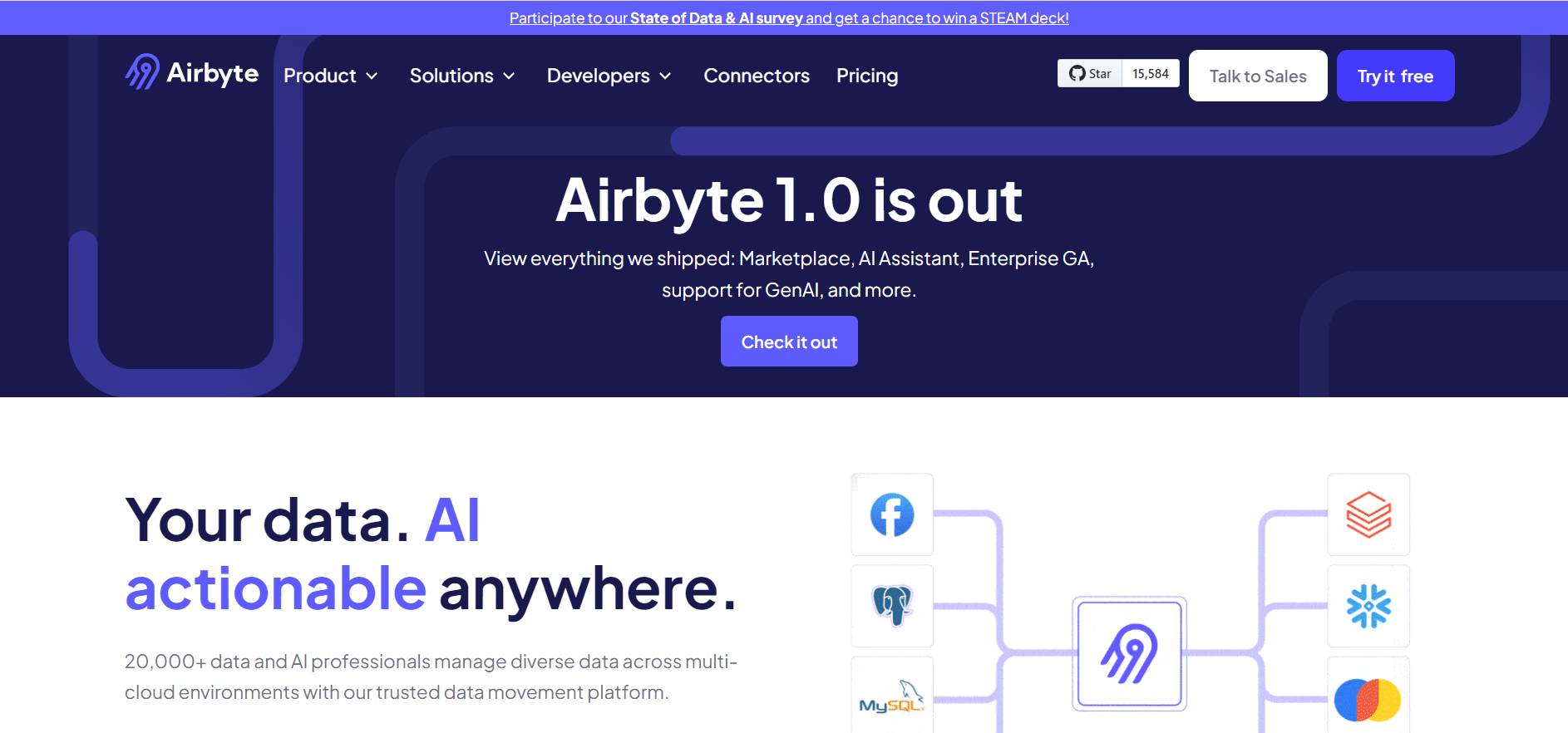
Rating: 4.5(G2)
Airbyte is a growing open-source ETL tool with support for over 400+ connectors and scalable data replication across cloud and on-premise setups.
Pricing:
- Free, Open Source
- Paid plans are also available for premium tiers.
Pros and Cons:
| Pros | Cons |
| Free and scalable | Requires technical setup |
| Wide connector support | Limited out-of-the-box transformation support |
5. Singer
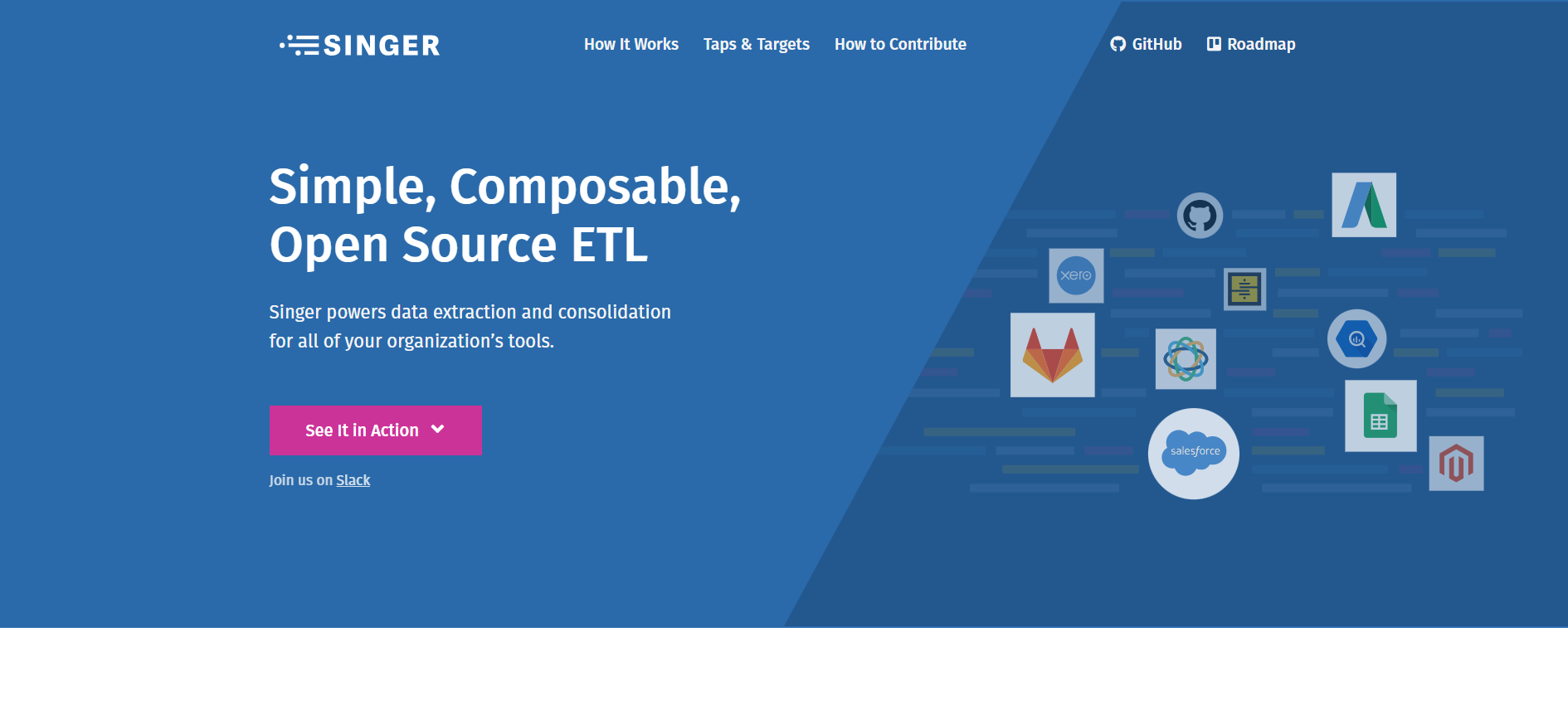
Rating: NA
Singer is an open-source, modular ETL tool that uses “taps” and “targets” for easy data extraction and loading.
Pricing:
- Free, Open-Source
Pros and Cons:
| Pros | Cons |
| Free and modular | No built-in transformations |
| Easy to integrate with other tools | Hard to manage larger teams |
Enterprise ETL Tools
1. Informatica Power Center
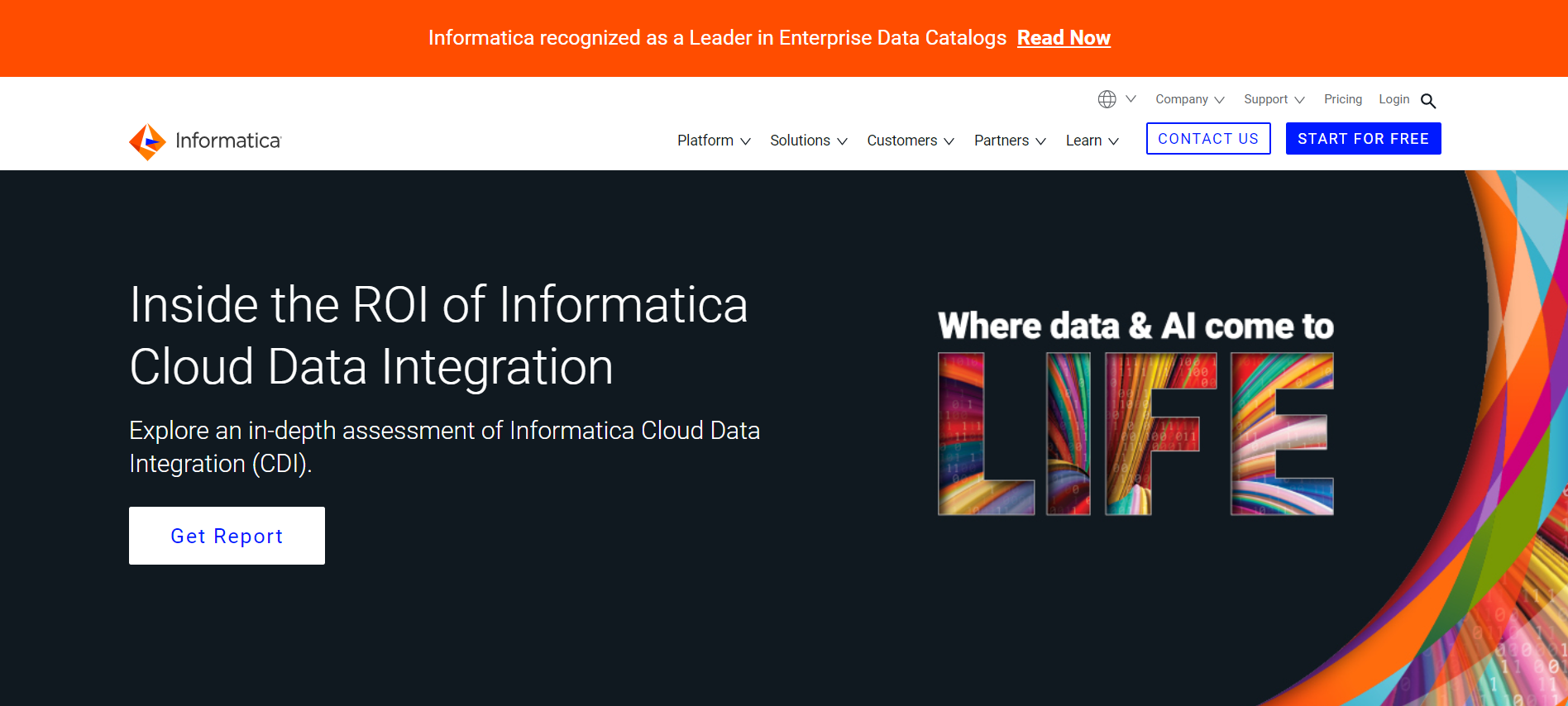
Rating: 4.4(G2)
Informatica is a robust, enterprise-grade ETL tool offering real-time data integration for large-scale operations. Supports complex, real-time ETL workflows. Works with on-premise and cloud environments.
Pricing:
- Pricing varies based on features, data volumes, and deployment models.
- Annual subscription costs can range from $100,000 to $300,000+ for large organizations.
- Additional costs for support, training, and add-ons like advanced data quality tools.
- For details you can check out Informatica’s pricing plan.
Pros and Cons:
| Pros | Cons |
| Real-time data processing | Complex setup |
| Reliable and scalable | Requires specialized training |
2. IBM Data Stage
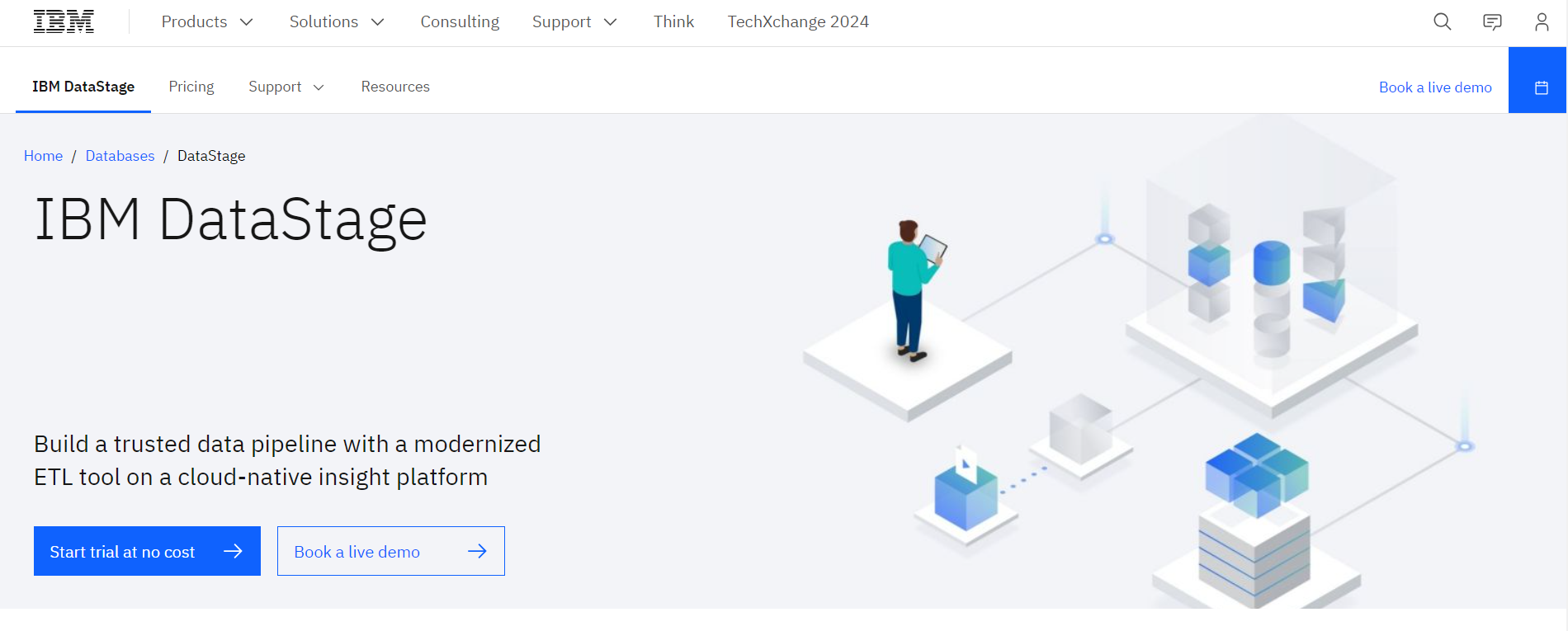
Rating: 4.0(G2)
IBM DataStage is an enterprise ETL solution optimized for big data projects and complex workflows. It is Designed for large datasets. Supports IBM Cloud and other cloud platforms.
Pricing:
- Licensing starts around $50,000+ annually for smaller implementations.
- Additional costs for advanced features and enterprise support packages.
- For details you can check out IBM Data Stage pricing.
Pros and Cons:
| Pros | Cons |
| Supports a wide range of ETL features. | Requires specialized training. |
| Excellent performance for large datasets. | Cost can sometimes be very high. |
3. Oracle Data Integrator(ODI)
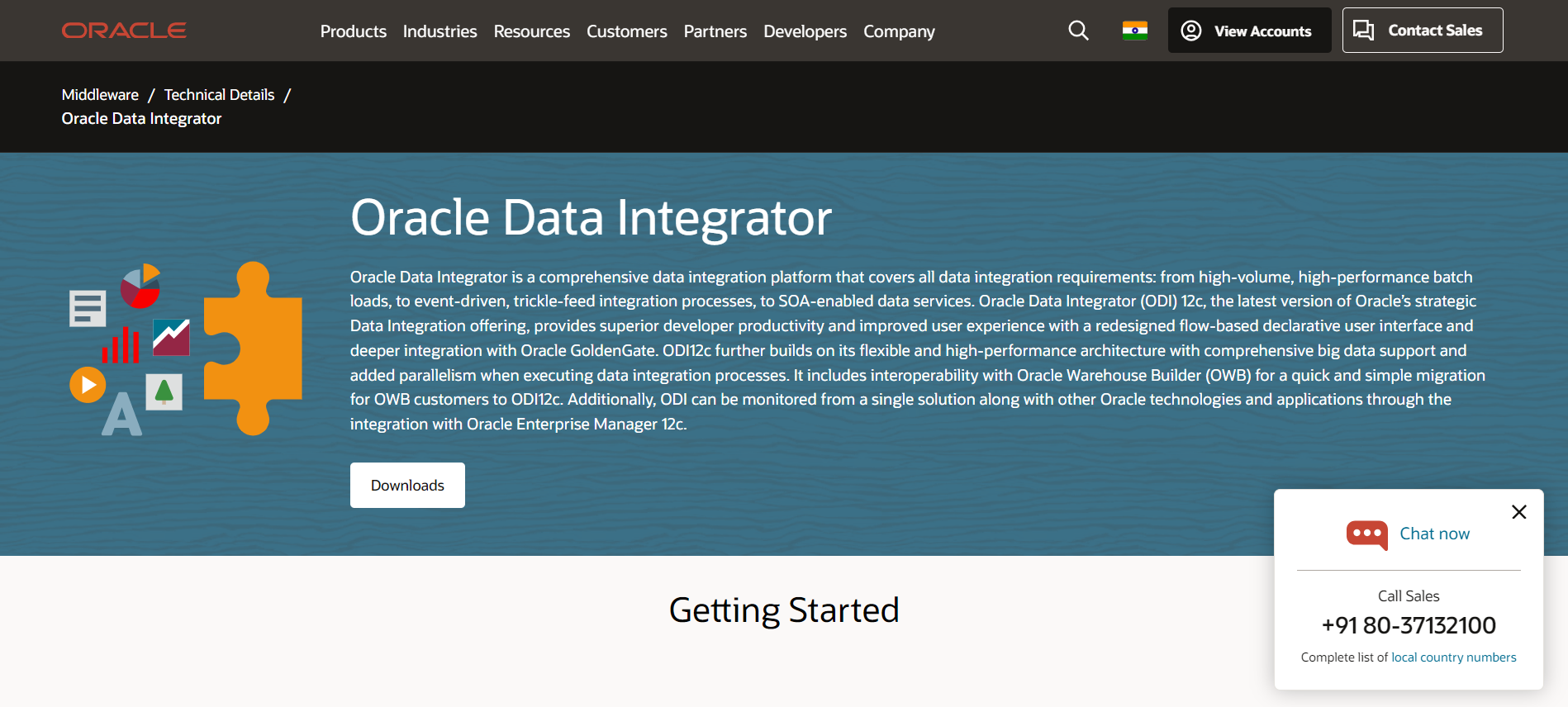
Rating: 4.0(G2)
Oracle Data Integrator is optimized for organizations using Oracle products but can support third-party data sources as well. It offers advanced transformation capabilities.
Pricing:
- Total costs can exceed $100,000+ annually for enterprise deployments.
- Higher costs for cloud integration and support for larger data environments.
- For details you can check out Oracle Data Integrator pricing.
Pros and Cons:
| Pros | Cons |
| Best for Oracle users | Expensive as compared to other solutions |
| Offers high performance for large data | Limited to Oracle environments |
4. Microsoft SSIS
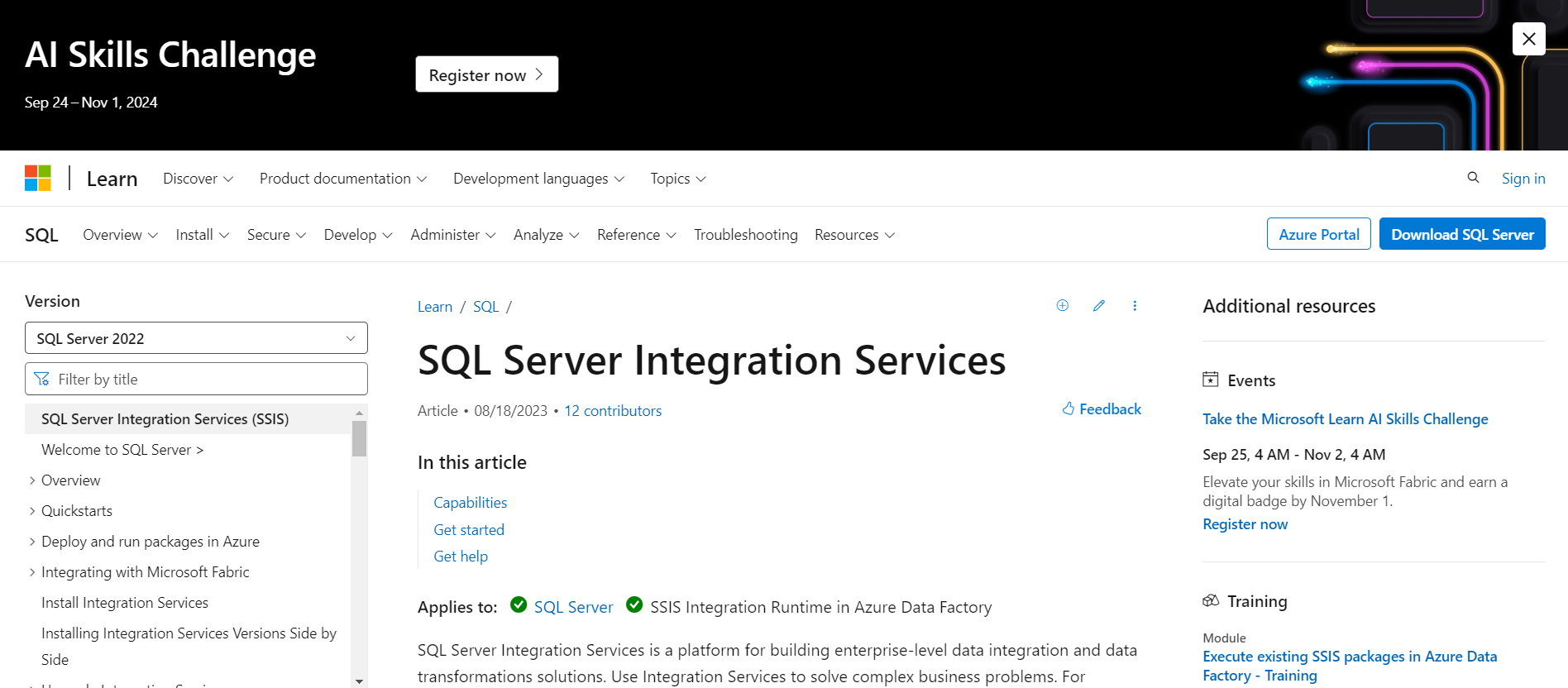
Rating: 4.3(G2)
SQL Server Integration Services (SSIS) is an ETL tool included in the Microsoft SQL Server suite, providing strong integration capabilities. It fully integrates with Microsoft SQL Server. Provides advanced support for complex transformations.
Pricing:
- Included with Microsoft SQL Server Standard and Enterprise editions, with licensing starting around $3,717 per SQL Server core.
- Additional costs for SQL Server Enterprise edition ($14,256 per core) for more advanced capabilities.
- Cloud-hosted pricing varies depending on Azure SQL and additional services.
- For details you can check out Microsoft SSIS pricing.
Pros and Cons:
| Pros | Cons |
| Seamlessly integrates with SQL Server | Limited outside the Microsoft ecosystem |
| Highly Scalable | Complex for non-SQL users |
5. SAP Data Services
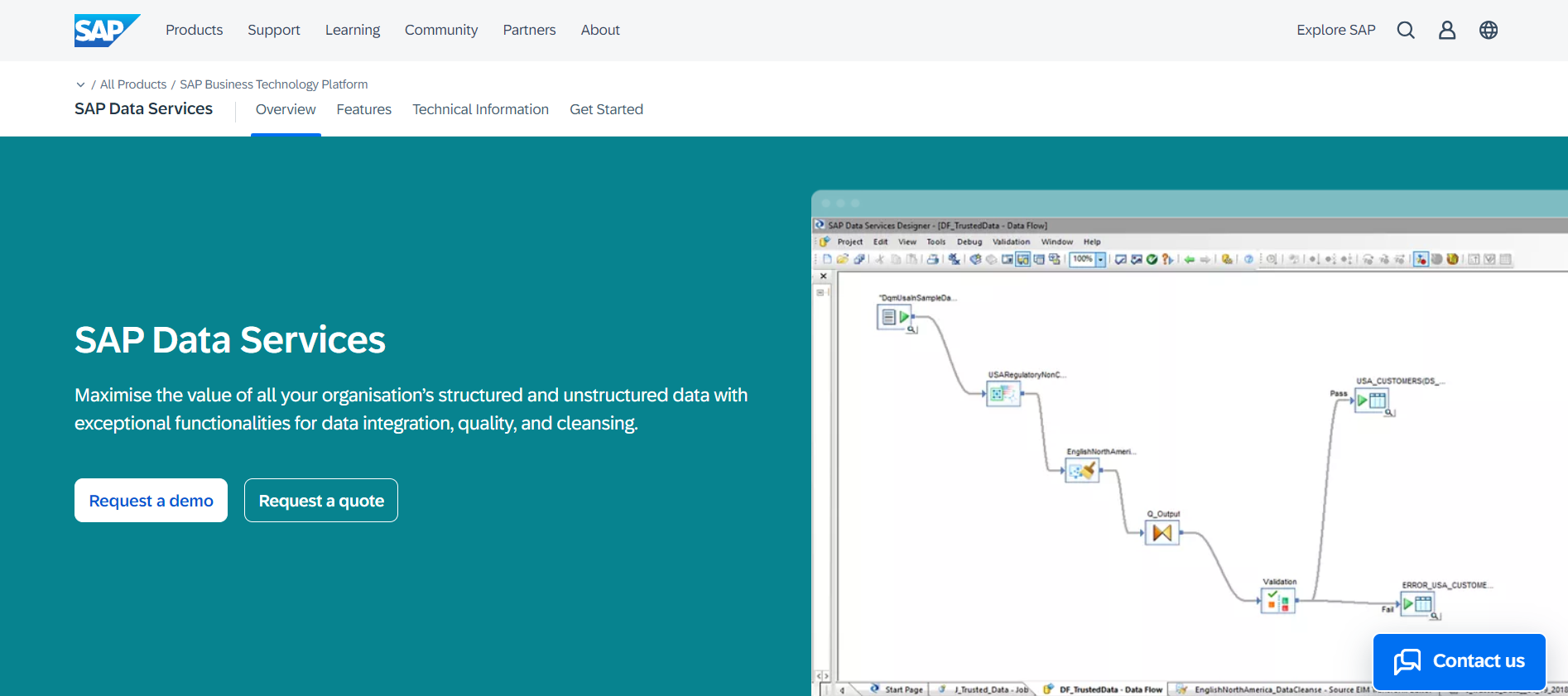
Rating: 4.6(G2)
SAP Data Services is a powerful ETL tool for integrating SAP environments with complex data transformations. It works seamlessly with SAP systems and supports real-time ETL workflows.
Pricing:
- Pricing varies widely based on SAP licensing, starting from around $50,000 annually.
- Costs increase with data volumes, SAP ecosystem integrations, and advanced features.
- It requires SAP BusinessObjects licenses, with additional maintenance costs.
- For details you can check out SAP Data Services pricing.
Pros and Cons:
| Pros | Cons |
| Strong SAP ecosystem integration | Expensive licensing |
| Real-time processing | Limited to SAP systems |
Customizable ETL Tools
1. Custom Python Pipelines
Rating: NA
Custom Python pipelines allow developers to build tailored ETL processes that fit their specific data requirements. This flexibility is ideal for complex workflows and unique data transformations. Users can leverage libraries such as Pandas, Dask, or PySpark to manipulate data efficiently.
Pricing:
- Free to use, relying on open-source Python libraries; infrastructure costs may apply.
- Development costs vary based on team expertise and time.
- Possible licensing fees for third-party libraries or tools.
Pros and Cons:
| Pros | Cons |
| Highly flexible and customizable. | Requires significant technical expertise. |
| Full control over data processing and transformations. | Development and maintenance can be time-consuming. |
2. Apache Spark
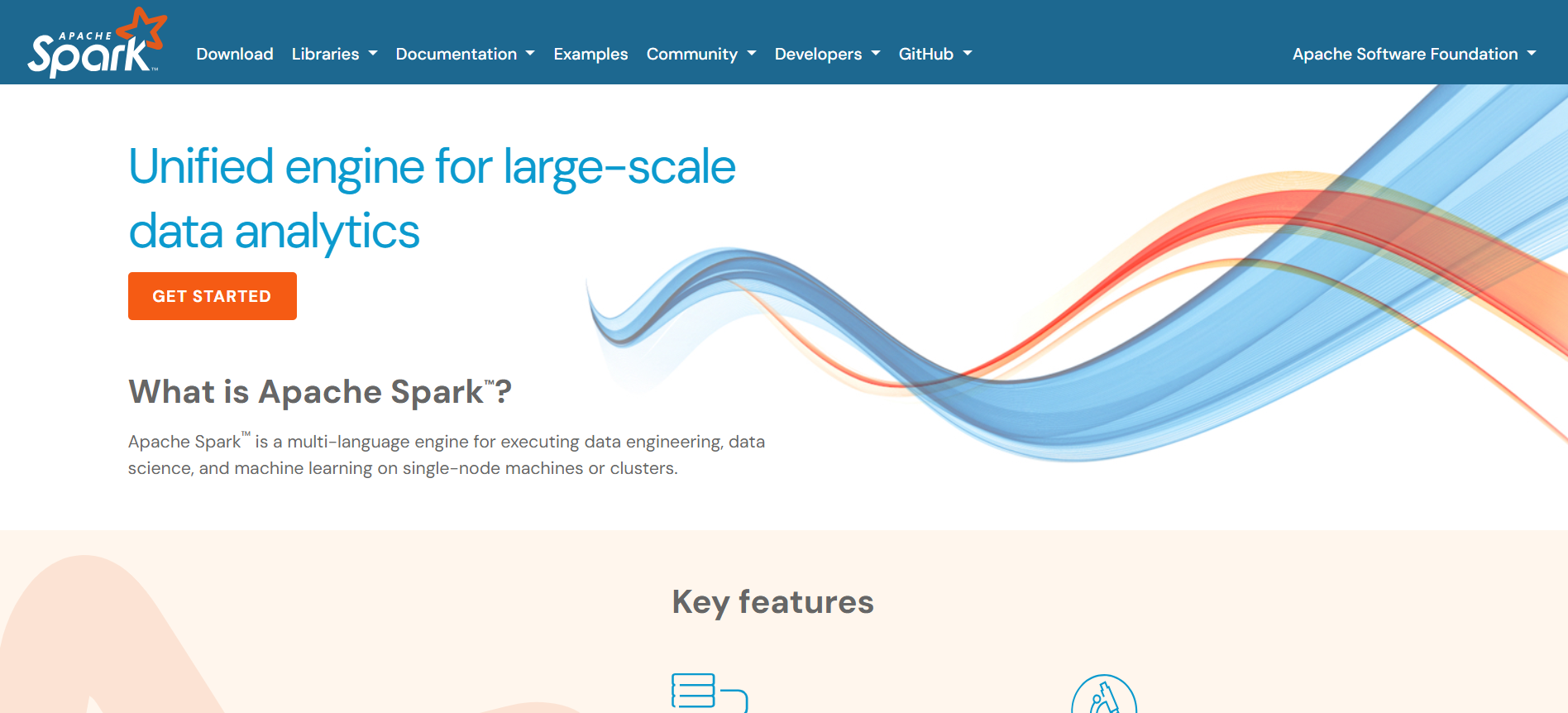
Rating: 4.3(G2)
Apache Spark is a powerful open-source engine designed for large-scale data processing, capable of handling both batch and streaming data. With its in-memory processing capabilities, Spark significantly speeds up data analytics tasks.
Pricing:
- Free and open-source; costs mainly arise from infrastructure for deploying clusters.
- Managed services like Databricks charge based on usage, starting at around $0.10 per DBU.
- Additional cloud resource and storage costs may apply.
Pros and Cons:
| Pros | Cons |
| Supports multiple programming languages (Python, Scala, Java). | Requires significant computational resources. |
| High performance due to in-memory processing. | It can be complex to set up and manage. |
3. Kettle (Pentaho Data Integration)
Rating: NA
Kettle, part of the Pentaho suite, is an open-source ETL tool that offers a user-friendly graphical interface for designing data integration workflows. It supports various data sources and provides extensive transformation capabilities.
Pricing:
- Free and open-source under the GPL license; enterprise versions incur costs.
- Enterprise pricing starts at approximately $1,000 per user.
- Additional costs for training, support, and integration may apply.
Pros and Cons:
| Pros | Cons |
| Strong community support and resources. | Some features may require advanced knowledge. |
| User-friendly graphical interface. | Performance can be an issue with very large datasets. |
4. DBT (Data Build Tool)
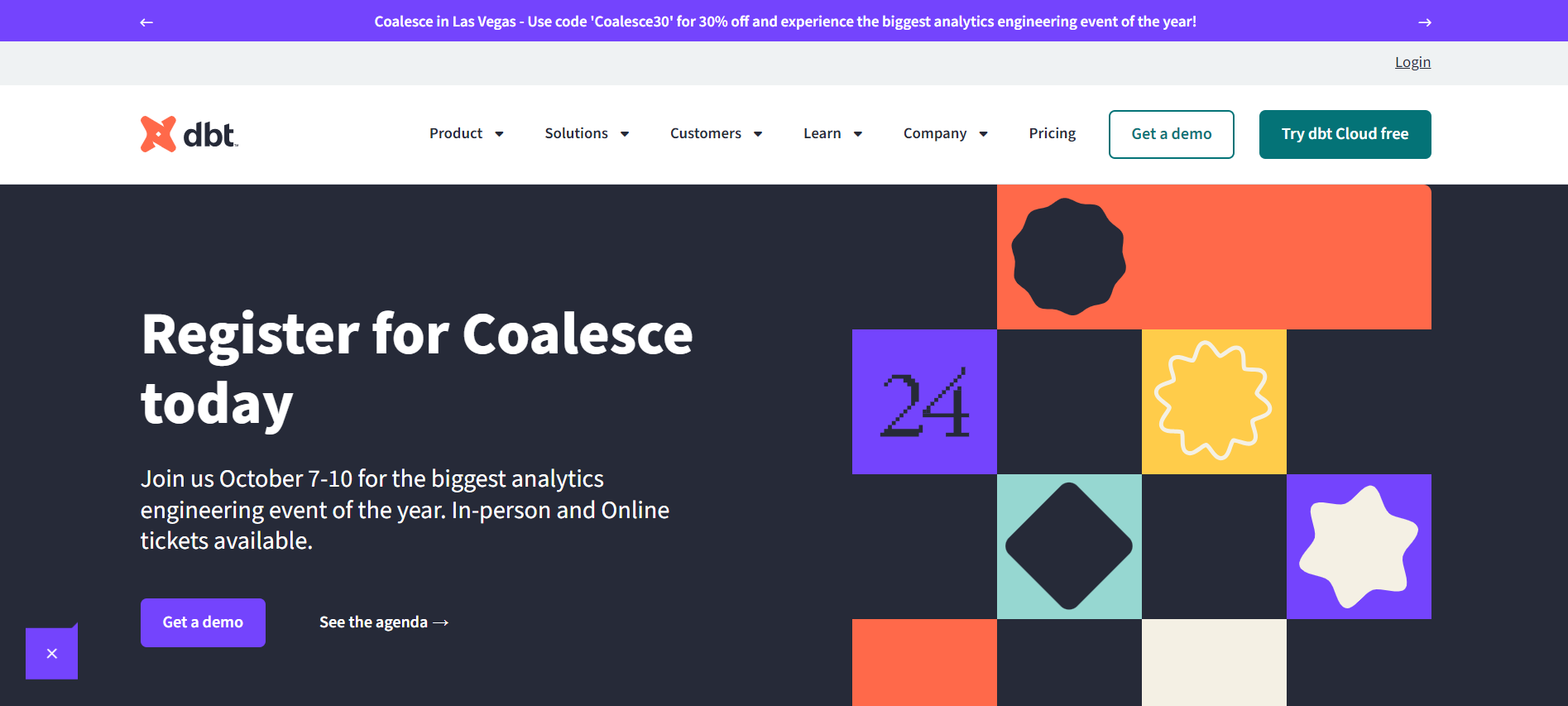
Rating: 4.8(G2)
DBT is designed to transform data within data warehouses, focusing on SQL-based transformations. It enables data analysts to write modular SQL code and manage complex transformations efficiently.
Pricing:
- Free and open-source for the core functionality; community edition allows for local use without cost.
- DBT Cloud offers managed services starting at $50 per user per month.
- Infrastructure costs depend on the underlying data warehouse used.
Pros and Cons:
| Pros | Cons |
| SQL-based, making it accessible for data analysts. | Lacks built-in extraction and loading capabilities. |
| Encourages best practices in data modeling and version control. | Requires other tools for a complete ETL process. |
5. Matillion
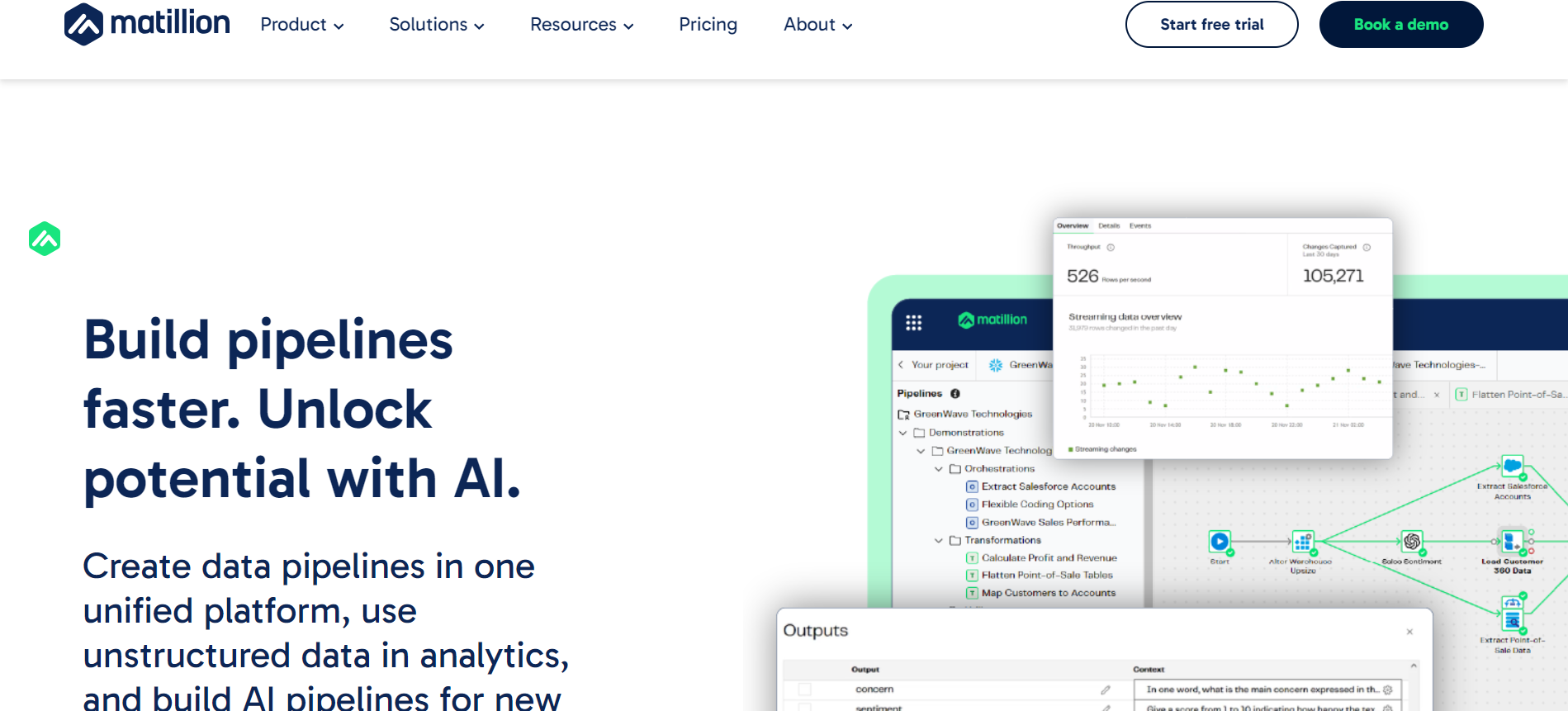
Rating: 4.4(G2)
Matillion is a cloud-native ETL tool optimized for data transformation and loading in cloud data warehouses like Snowflake, Redshift, and BigQuery. Its intuitive interface enables users to rapidly create customizable ETL pipelines tailored to specific data integration needs.
Pricing:
- Subscription-based pricing starts at approximately $1,000 per month for basic versions.
- Costs vary based on data volume and selected features.
- Additional cloud resource pricing may apply based on usage.
- For details, you can check out Matillion’s pricing.
Pros and Cons:
| Pros | Cons |
| High-speed data processing and transformation capabilities allow for complex workflows. | Subscription costs can add up, especially with increased usage and additional features. |
| User-friendly drag-and-drop interface that simplifies the creation of custom pipelines. | It may present a steeper learning curve for non-technical users due to its rich feature set. |
Comparison of Top 20 ETL Tools:
| Tool | Value for Money | Customer Support | Ease of Use | Integration | Documentation | Community Support |
| Hevo Data | High | High | High | High | High | High |
| AWS Glue | Medium | Medium | Medium | High | Medium | Medium |
| Fivetran | Medium | Medium | High | High | Medium | Medium |
| Google DataFlow | Medium | Medium | Medium | Medium | Medium | Medium |
| Stitch | Medium | Medium | High | High | Medium | Medium |
| Apache Nifi | High | Medium | Medium | Medium | High | Medium |
| Airflow | Medium | Medium | Low | Medium | High | Medium |
| Pentaho Data Integration | Medium | Medium | Medium | Medium | Medium | Medium |
| Airbyte | High | Medium | Medium | High | Medium | Medium |
| Singer | High | Low | High | Medium | Medium | Medium |
| Matillion | Medium | Medium | Medium | High | Medium | Medium |
| Informatica Power Center | Low | High | Medium | High | Medium | Medium |
| IBM Data Stage | Low | High | Medium | Medium | Medium | Medium |
| Oracle Data Integrator (ODI) | Low | High | Medium | Medium | Medium | Medium |
| Microsoft SSIS | Medium | Medium | Medium | Medium | Medium | Medium |
| SAP Data Services | Low | High | Medium | Medium | Medium | Medium |
| Custom Python Pipelines | High | Medium | Medium | Medium | Medium | Medium |
| Apache Spark | High | Medium | Low | Medium | Medium | Medium |
| Kettle (Pentaho Data Integration) | Medium | Medium | Medium | Medium | Medium | Medium |
| DBT (Data Build Tool) | Medium | Medium | High | Medium | Medium | Medium |
Why Hevo is the First Choice for Data Pipelines?
Hevo is a no-code data integration platform that enables businesses to effortlessly connect, transfer, and transform data across various sources and destinations in real-time. Its intuitive interface simplifies the process of building data pipelines, allowing users to focus on leveraging their data rather than managing the complexities of integration.
Key Benefits of Hevo:
- No-Code Solution: Users can create data pipelines without writing any code, making it accessible for teams without technical expertise.
- Real-Time Data Processing: Hevo facilitates real-time data ingestion, ensuring that businesses have access to the most current information for decision-making.
- Wide Integration Support: The platform supports numerous data sources and destinations, providing flexibility to integrate with various applications and databases.
Conclusion
Choosing the right ETL tool depends on your business’s data needs, the scale of your operations, and your technology stack. Whether you’re looking for a no-code, fully managed cloud-based tool like Hevo Data or prefer open-source tools like Apache Nifi for more flexibility, each ETL solution has unique features to consider. By evaluating the tools based on real-time processing, ease of use, integration capabilities, and cost, you can identify the best solution that fits your data infrastructure and supports your business’s growth.
FAQ on ETL Tools
1. What does ETL stand for?
ETL stands for Extract, Transform, Load. It is a data integration process that involves extracting data from various sources, transforming it into a suitable format, and loading it into a target system.
2. What are the 4 types of ETL tools?
The four types of ETL tools are cloud-based ETL tools (e.g., Hevo), traditional ETL tools (e.g., Informatica), open-source ETL tools (e.g., Apache NiFi), and self-service ETL tools (e.g., Talend). Each type serves different needs and use cases in data integration.
3. Which ETL tool is used most?
Informatica is one of the most widely used ETL tools in the industry, known for its robust features, scalability, and comprehensive data integration capabilities. Other popular tools include Talend and Fivetran, but Informatica remains a leader in enterprise environments.

